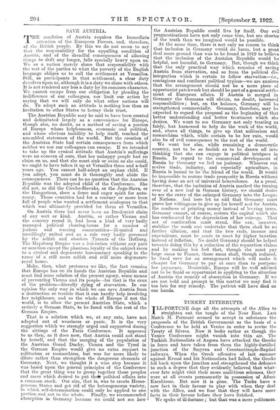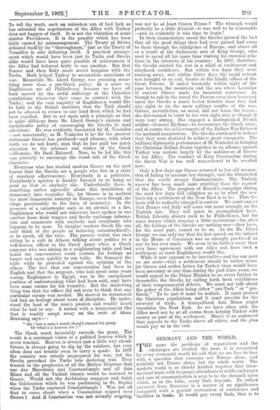TURKEY INTERRUPTS.
ILL-FORTUNE dogs all the attempts of the Allies to straighten out the tangle of the Near East. Last March M. Poincare seemed to accept in substance the proposals of the British Government as the basis of a Conference to be held at Venice in order to revise the Treaty of Sevres. Now it looks rather as though the Venice Conference might vanish into thin air. The Turkish Nationalists of Angora have attacked the Greeks in force and have taken from them the highly-fortified junction of the Smyrna and Constantinople-Bagdad railways. When the Greek offensive of last summer against Kemal and his Nationalists had failed, the Greeks fell back upon the junction and strengthened the defences to such a degree that they evidently believed that what- ever fate might visit their more ambitious schemes, they were at all events permanently in possession of Afium Karahissar. But now it is gone. The Turks have a new fact in their favour to play with when they deal with the Allies, and we fear that they will have more facts in their favour before they have finished. We spoke of ill-fortune ; but that was a mere politeness. To tell the truth, such an unbroken run of bad luck as has attended the negotiations of the Allies with Turkey does not happen of itself. It is not the visitation of some sinister Providence. It is the penalty which has been fairly earned by mismanagement. The Treaty of Sevres defeated itself by its " thoroughness," just as the Treaty of Versailles is also defeating itself. A practical arrange- ment which would have been just to Turks and Greeks alike would have been quite possible of achievement if the Allies had behaved fairly to one another. But first France and then Italy made secret bargains with the Turks. Both helped Turkey to accumulate munitions of war. Meanwhile, Mr. Lloyd George was pursuing some- thing more than a pro-Greek policy. In a sense we Englishmen are all Philhellenes, because we have all been moved by the awful sufferings of the Christian populations whenever they came in contact with the Turks ; and the vast majority of Englishmen would like to hold to the British tradition that the Turk should not be allowed to return to any land from which he had been expelled. But to act upon such a principle as that is quite different from Mr. Lloyd George's curious and inexplicable policy of encouraging the Greeks in mad adventure. He was evidently fascinated by M. Venizelos --not unnaturally, as M. Venizelos is by far the greatest statesman Greece has produced—and rumour, with what truth we do not know, says that he has paid too much attention to the schemes and wishes of the Greek millionaire, Sir Basil Zaharoff. Now, to be led like this was precisely to encourage the worst side of the Greek character.
Everyone who has studied modern Greece on the spot knows that the Greeks are a people who live in a state of constant effervescence. Everybody is a politician. Everybody's opinion is frankly listened to as being as good as that of anybody else. Undoubtedly there is something rather agreeable about this translation of democracy into everyday life, for Greece is in method the most democratic country in Europe, even though she clings passionately to the form of monarchy. In the presence of a catastrophe such as an air-raid or a fire, Englishmen who would not otherwise have spoken to one another loose their tongues and freely exchange informa- tion and comments with anybody and everybody who happens to be near. To imagine modern Greek life one may think of the people as behaving catastrophically, so to speak, all the time. The present writer was once sitting in a café in Athens talking about politics to a well-known officer in the Greek Army when a Greek sergeant who was sitting at a neighbouring table and had heard our conversation could contain his feelings no longer and came quickly to our table. He thumped the table while he protested against the opinions of the officer. The fact that our conversation had been in English and that the sergeant, who had spent some years among Englishmen in Egypt, was in the exceptional position of understanding what had been said, may have been some excuse for his temer•ity. But the interesting thing was that the officer did not seem to think that any particular excuse was needed. He showed no resentment and had no feelings about want of discipline. He under- stood the heat of the man's passion and readily heard what he had to say. A nation with a temperament like that is readily swept away on the crest of ideas. Browning says :— " 4h. ! but a man's reach should exceed his grasp Or what's a heaven for 7 " The Greek reach invariably exceeds the grasp. The result is a continual vision of a political heaven which is never reached. Heaven is always just a little way ahead. Greece is always going to dig up the rainbow, but very often does not trouble even to carry a spade. In 1897 the country was utterly unprepared for war, yet the Greeks provoked the Turks into declaring war. They trusted to the prophecies of all the Mother Shiptons that one day- Macedonia and Constantinople and all Asia Minor and all the Turkish islands would be restored to Greece. Would not the Archbishop reappear and finish the Celebration which he was performing in St. Sophia when the Turks captured Constantinople ? Was not all that to come about when a Constantine reigned over Cireece / And if Constantine was. not actually reigning, was not he at least Crown Prince ? The triumph would probably be a little delayed—it was well to be reasonable —and so evidently it was time to begin ! In their characteristic mood the Greeks ignored the fact that all the good things they had ever gained had come to them through the indulgence of Europe, and above all as a result of the diplomatic arts of King George, who used to spend all his spare time visiting his crowned rela- tions in the interests of his country. In 1897, therefore, the Greeks started the war in a whirl of excitement and misplaced confidence. But within ten days they were running away, and within thirty days the rapid retreat was brought to an end, thanks to the kindly offices of the Great Powers. It ended ironically within sight of the pass between the mountain and the sea where Leonidas of ancient Greece made his immortal resistance. As though to rub in the moral the Powers even then bestowed upon the Greeks a much better frontier than they had any right to on the mere military results of the war. Greece, nevertheless, as usual, did not learn the lesson ; she determined to trust to her own right arm as though it were very strong. She engaged a distinguished French soldier—General Eydoux—to reconstruct the Greek army, and of course the achievements of the Balkan War flattered the national imagination. The Greeks continued to believe that they were destined to achieve great conquests. The brilliant diplomatic performance of M. Venizelos in bringing the Christian Balkan States together in an affiance against Turkey was undone largely by the unfairness of Greece to her Allies. The conduct of King Constantine during the Great War is too well remembered to be recalled now.
Only a few days ago Greece returned to her old occupa- tion of failing to measure her strength, and she threatened that she would occupy Constantinople. The Turkish answer has been much more startling than the reproof of the Allies. The progress of Kemal's campaign during the next few days will enlighten us as to what the new basis for a settlement of the Near East is to be. That the basis will be radically changed is certain We must expect that France and Italy will come out more strongly on the Turkish side. They will point to accomplished facts. British Liberals always used to be Philhellenes, but for some reason which remains a little mysterious—for, after all, the failings of the Greeks are nothing new—they have, for the most part, ceased to be so. As for Mr. Lloyd George, we can only say that his last speech on the subject in the House of Commons was as strongly pro-Greek as any he has ever made. We seem to be further away than ever from agreement with our Allies and from such a settlement as most Englishmen would like. While it now appears to be inevitable—and for our part we are sorry—that a settlement should be rather worse for Greece and rather better for Turkey than would have been necessary at any time during the past three years, we would appeal to the Prime Minister in no event further to demoralize the Greeks by calling forth fresh exhibitions of their temperamental defects. We must not talk about the policy of the Allies being either " pro-Turk " or " pro- Greek." To be just it must be neither. It must protect the Christian populations, and it must provide for the recovery of trade. A tranquillized Asia Minor might transform the Near East. As we have often said, the Allies need not be at all averse from helping Turkey with money as part of the settlement. Money is an argument that appeals to the Turks above all others, and the plan would pay us in the end.



































 Previous page
Previous page